人教版必修4 Unit 4 Body language reading and language points(共72张PPT)
文档属性
| 名称 | 人教版必修4 Unit 4 Body language reading and language points(共72张PPT) | 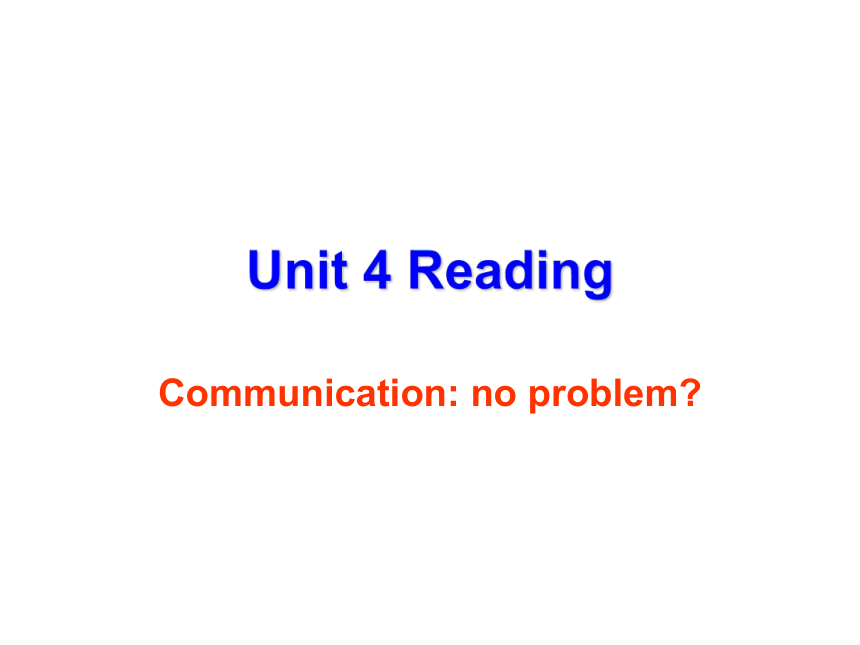 | |
| 格式 | zip | ||
| 文件大小 | 6.7MB | ||
| 资源类型 | 教案 | ||
| 版本资源 | 人教版(新课程标准) | ||
| 科目 | 英语 | ||
| 更新时间 | 2014-06-19 18:18:03 | ||
图片预览

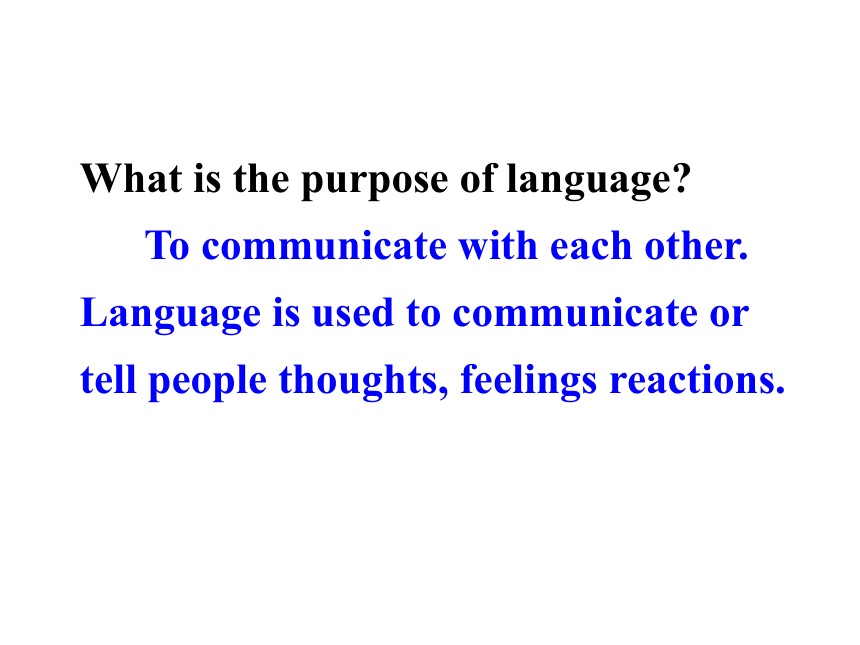
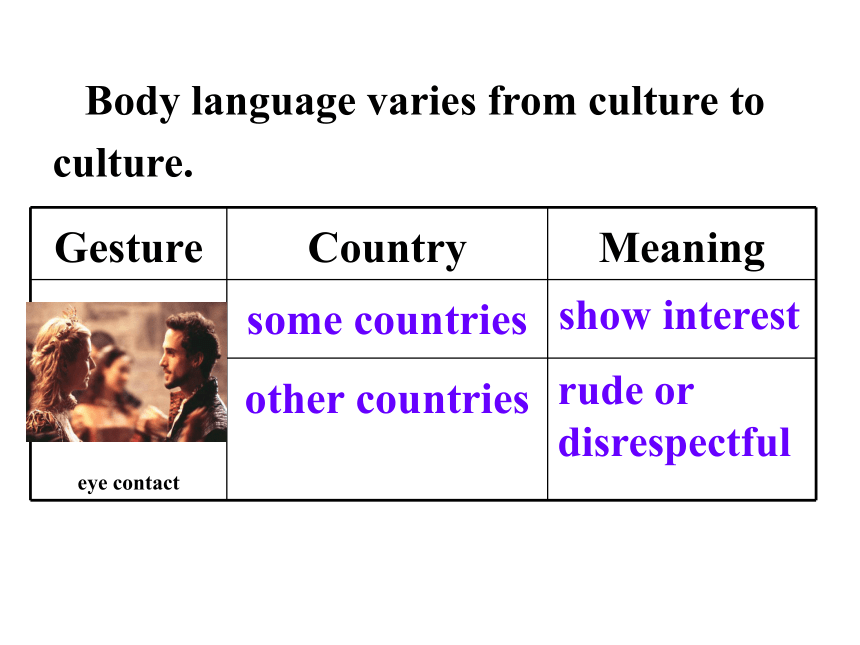
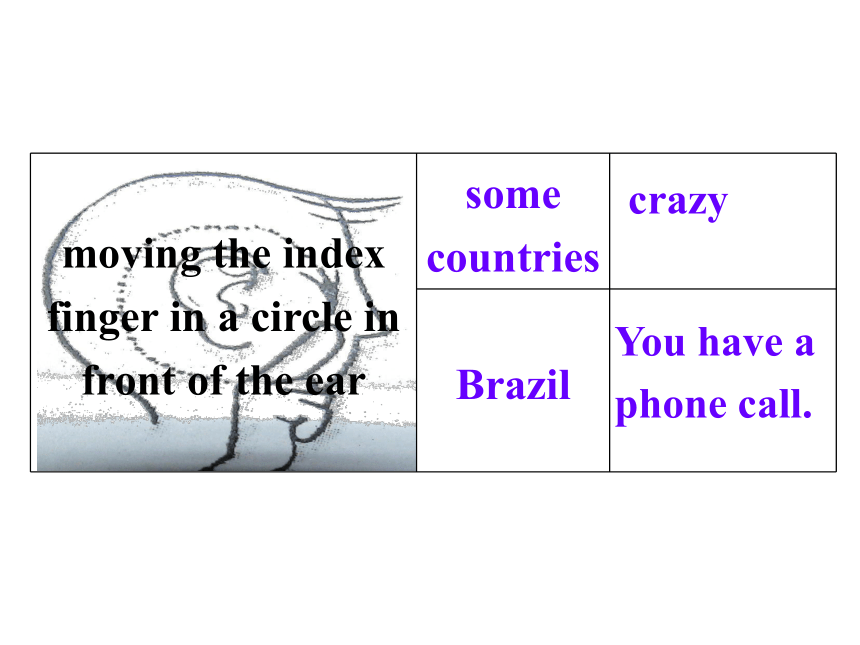
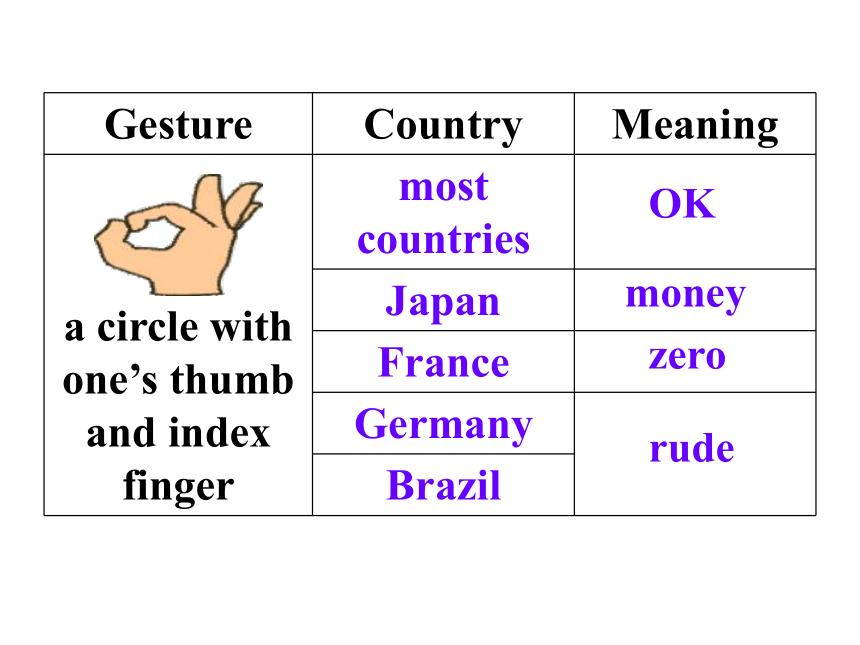
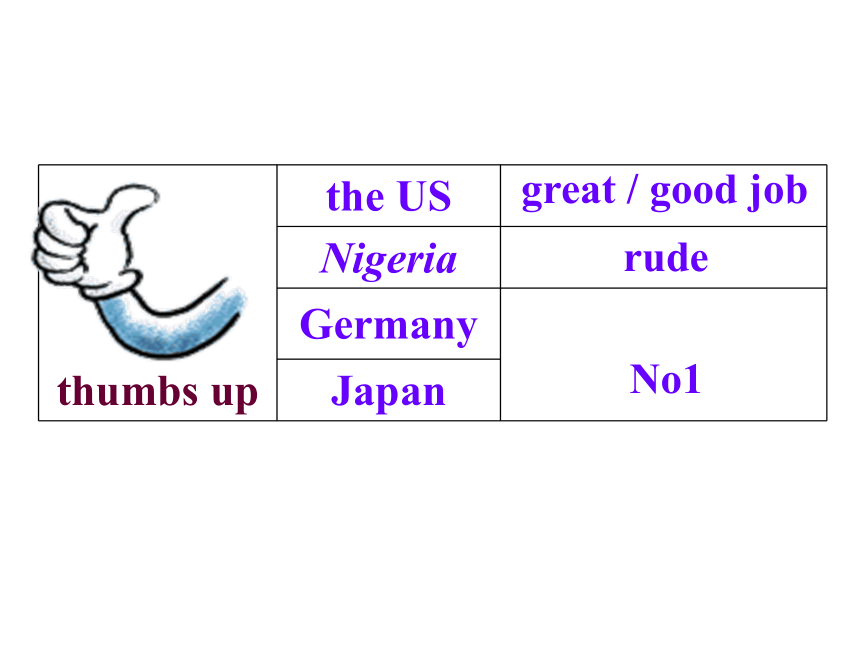
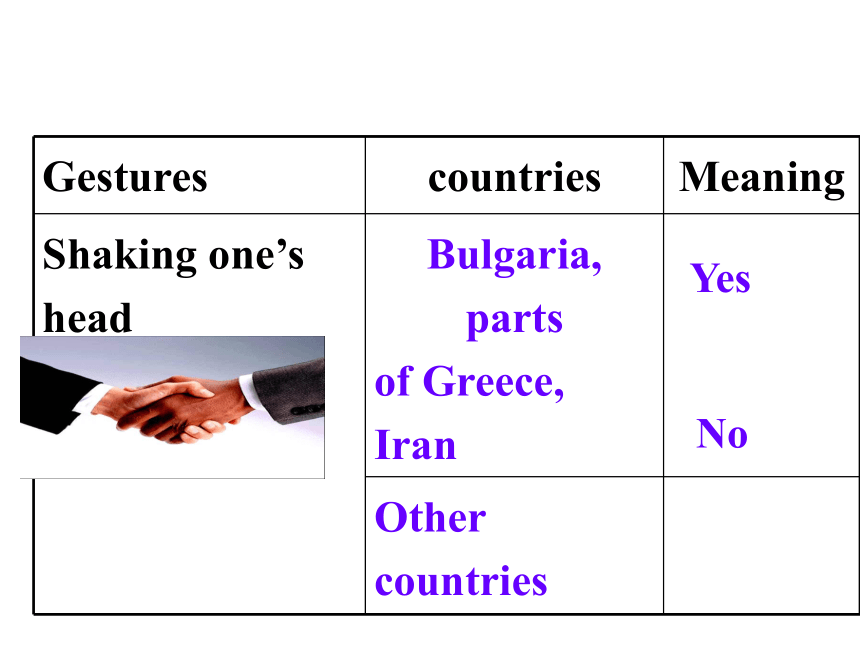
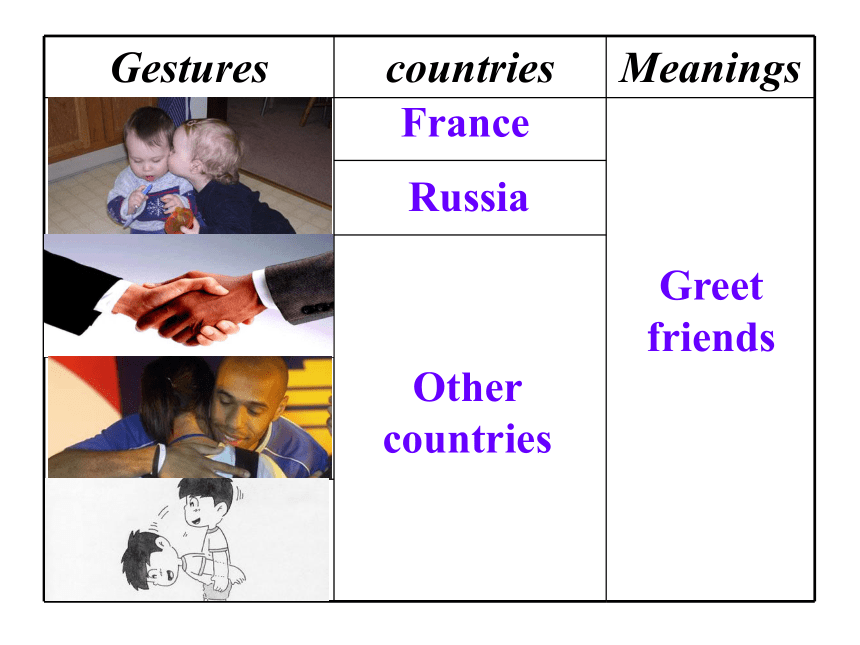

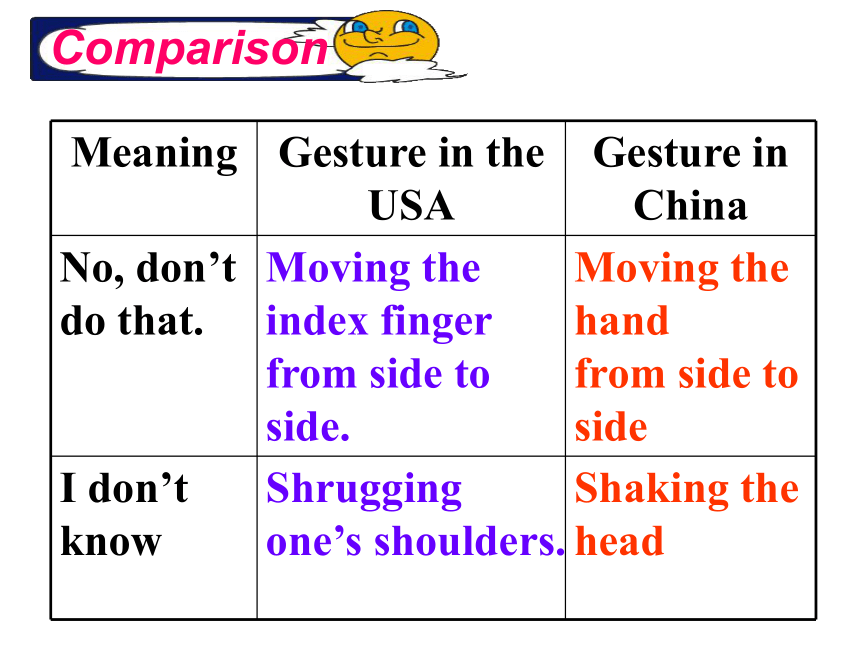
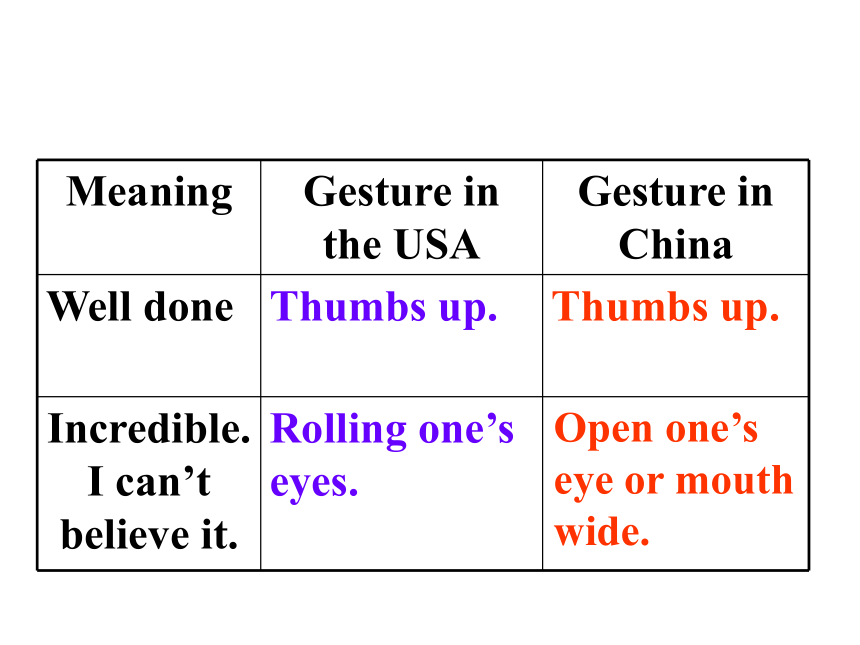
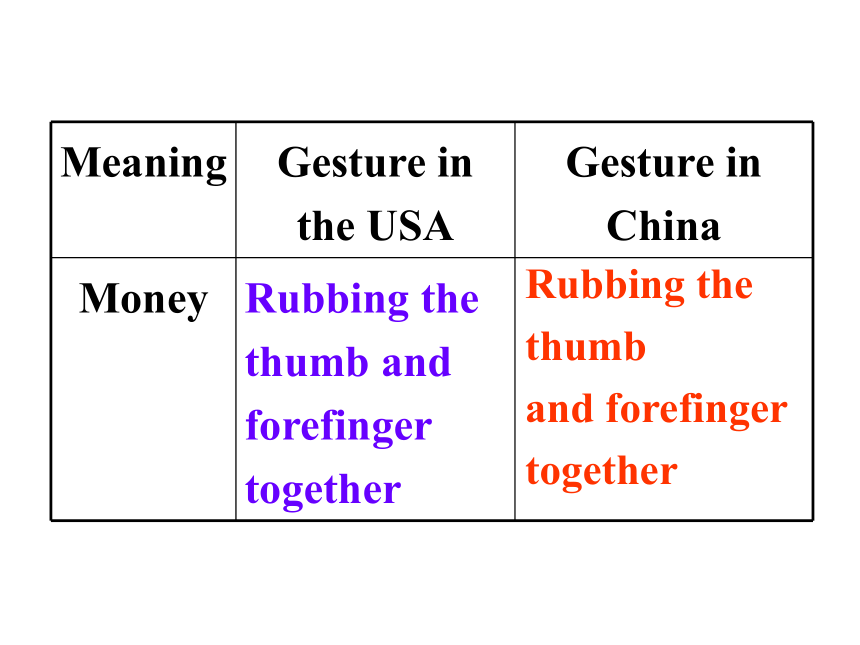
文档简介
课件72张PPT。Unit 4 ReadingCommunication: no problem?What is the purpose of language?
To communicate with each other. Language is used to communicate or tell people thoughts, feelings reactions. Body language varies from culture to culture.show interestrude or
disrespectfulcrazyYou have a
phone call.zerorudemoneyOKNo1rudegreat / good jobNoYesGreet
friendsFranceRussiaOther countriesReading ComparisonOpen one’s eye or mouth wide. Rubbing the thumb
and forefinger togetherMoving one’s hand up and down with the palm facing down. Can you guess what the following
gesture from Japan means ?angry Can you guess what the following
gesture from France means ?I don’t believe you. Can you guess which man won the basketball game?The man on the right.What do people usually do when meeting?Shake hands
Kiss
Embrace
bow
Touch nosesChina, Britain
Russia, France, Arab
Some western countries
Japan, Korea
Maori in New ZealandReading
comprehension 1. What is the main idea of the text?
A. There are different customs in
different countries.
B. Foreigners should follow the
customs of the country where they
are visiting.
C. People use body movements to send
messages and different body
movements have different meanings.
D. The importance of knowing customs. 2. If two men stand close to each other while talking, they cannot be from _____.
A. an Arab country B. USA
C. Britain D. Russia3. What should a Chinese young man do when he meets his Russian friend in Moscow?
A. Kiss him.
B. Nod his head to his friend.
C. Shake hands with him.
D. Smile at him. 4. If you go to some Asian countries, which of the following can you do?
A. Touch the head of a boy.
B. Nod your head to others.
C. Sit with your feet pointing at
another person.
D. Kiss each other.5. “Foreigners should follow these customs when they are visiting these countries.”
The underlined word here means ___.
A. habits B. fault
C. words D. performance 1.Who are the people mentioned in the passage?
2. Where are they from?ChinaTony GarciaColumbia
Julia Smith
BritainAkira Nagata
Japan
George Cook
CanadaAhmed Aziz
Jordan Darlene CoulonFranceYouTony Garcia
(Columbia)
Julia Smith
(Britain)
Akira Nagata
(Japan)
George Cook
(Canada)
Darlene Coulon
(France)
Ahmed AzizF . stand quite close to other men to talk but will usually not touch women.Group Discussion
Reasons for different
ways of greetings
different culturesdifferent customsdifferent racesdifferent habits----------------------ComparisonNot all cultures greet each other the same way--- (para4) 比较 No cultures greet ---
2. Not all members of all cultures behave the same way. (para5) 比较No members of --- Body language varies from culture to culture.
People from different cultures have different
body languages. Just like a saying goes that:
When in Rome, do as the Romans do.
summaryTrue or FalseThe writer will meet the students at a station.
2. Visitors greet each other differently when they
meet for the first time.
3. English people usually do stand very close to others as soon as they meet.
4. French people behave warmly to the people that they know.
5. Body language is the same across the world.
FTFTF Get the detailed parts of the text . Finish exercise2 on page 27.Language points1. Yesterday , another student and I , representing our university ‘s association , went to the Capital International Airport to meet this year’s international students. 该句中的v-ing形式做定语, 相当于一个定语从句。Who are representing our university association .meet 的用法 :
(1)作动词,表示“见面”。We write regularly but seldom meet.我们常写信但很少见面.I met with a lot of difficulties in the work . 在工作中我遇到了许多困难.(2)作动词,表示 “遭遇” 。(3)作动词,表示 “认识,结识”Come to the party and meet some interesting people . 来参观聚会并且认识一些有意思的人.Will you meet me at the station ?你会到车站接我吗?Does this car meet your hopes ?这辆小汽车能满足你的愿望吗?(4)作动词,表示 “欢迎”.(5)作动词,表示 “满足”.meet , meet with 的用法区别(1)meet 往往暗示双方从相反或不同的方向相向而行,其宾语通常是人或物质类的名词, 如: a person , a bus , a train等.(2)meet with 有 "遭受,经历"的含义,其后多接抽象名词,如:accident ,difficulty ,misfortune 等; meet with 后也可接表示人的名词,这时强调"遇到"的偶然性. 此外, meet with 表示"欢迎,会见"时可用meet 代替.looking around curiously 作伴随状语,enter(进入)的状态.
例如:.., I saw several young people enter the waiting area looking around curiously ......
我看见几个年轻人进入候机室好奇的四处张望.The children ran out of the room , laughing and talking . 孩子们又说又笑地跑出了房间.Mr Smith sits at window ,reading newspapers .史密斯先生坐在窗边看报纸.introduce vt.介绍,引进. 名词形式为introduction,意为"介绍;传入;引进;推行;采用".例如:After I met them and then introduced them to each other , I was very surprised.我迎接他们之后,介绍他们彼此认识,我感到很惊讶.He introduced John to Mary . 他把约翰介绍给玛莉.We 'll introduce a new fashion. 我们将引进一种新样式.2. They were coming to study at Beijing University .将来进行时: 表示按计划安排, 将来固定某个时间必定正在发生的事情。3. Tony approached Julia, touched her shoulder and kissed her on the cheek.(1) approach 名词 n. 靠近;临近;接近
going near or nearer to a place
The enemy ran away at our approach.
在我们接近时, 敌人跑了。 verb + sb. in/ on/ by +the 身体部位 We heard the approach of the train.
我们听见火车开过来了。
n. 方法;步骤;通路;通道
The approach to the house was a narrow path.
通往这房子的路是一条狭窄的小径。 The best approach to learn a foreign language is the study of the spoken language.
学习外语的最好的途径是学口语。at the approach of winter 冬季将临的时候
be easy of approach 容易到达; 容易接近
on the approach of death 临死的时候with the approach of winter
随着冬季的来临
make approaches to sb. 想亲近某人 动词 v. 走近;靠近;接近 come near or nearer to someone or something You must approach the bird very quietly or it will fly away.
你必须悄悄地走近那只鸟, 否则它会飞走的。 The summer is approaching.
夏季即将来临。approach sb. about sth.
为某事同某人打交道
approach sb. for information
向某人了解情况
approach sb. with a suggestion
向某人建议 touch vt. 触摸,接触. Can you touch the top of the blackboard?你能碰到黑板的顶部吗?Please don't touch the exhibits.请勿触摸展品.The branches of the willow can touch the water.柳枝能碰到水面.相关短语:
keep in touch with sb
与某人保持联系
keep in touch with the current situation
关心当前形势lose /be out of touch with sb
与某人失去联系get in touch with sb by telephone 用电话与某人取得联系辨析:
keep in touch with , be in touch with , get in touch with 的用法区别keep in touch with ,相当于be in touch with, 意为“与......保持联系”,前者表示动作,后者表示状态;
get in touch with 意为"与......取得联系" , 表示动作. We used to keep in touch with each other by telephone , but now we are in touch with each other by e-mail. 我们以往通过电话保持联系,但现在我们通过电子邮件保持联系.We were worried about him because we could't get in touch with him .我们担心他因为我们和他联系不上.appear 意为"显得,好象". It appears that .. 意为"看起来....".例如:
She stepped back appearing surprised and put up her hands , as if in defence .
他吃惊的往后退,举起双手好象在防卫。It appeared that you were given the wrong information . 你似乎得到了错误的信息.It appears that the plane is very small when it files in the high sky .飞机在高空飞行显得非常小.辨析: appear , seem , look 的用法区别
appear , seem ,look 都可以做系动词,并且都可以为"似乎;好象;看上去",从词义上看,appear表示从外表或表面看上去"好象;似乎",因此有时暗含着事实上并非如此的意思;look 强调从视觉上得出的印象;seem 则表示有某种根据的判断,这种判断往往接近或符合事实的。(1)appear,look,seem后可接形容词或名词。It appears a true story. 这个故事似乎是真的。He appeared calm, but his heart was beating with fear . 他外表显得很平静,但心里却因为害怕而跳个不停。He looks a perfect fool .他看起来像个十足的傻瓜。She seems (to be ) quite happy . 她似乎非常幸福。She appears to have many friends .她好像有很多朋友。(2)appear, seem接实意动词的不定式,而look不能接实意动词的不定式,但可接to be.Judging from her letter, she looks to be the best person for the job. 从她的信来判断,她似乎是这个工作的最适当的人选。He seemed to hesitate for a minute. 他似乎由于了一会儿。(3)三者都可以接从句,但look只能接as...if 引导的从句,不能接that 引导的从句。It appeared(that)the plane did not land in Rome. 飞机似乎没在罗马着陆。It tooks as if it's going to rain.看起来好像要下雨了。It seems that she likes her new job.她好像喜欢她的新工作。 reach vt. & vi.到达,伸向,延伸,通向。
As they were introduced , George reached his hand out to the Japanese student.
当他们被介绍对方时,乔治把手伸向了那个日本学生。He reached London last week .他上周到达了伦敦。他伸出手去拿枪。He reached for the gun. 去年夏天这片森林一直延伸到河边。The woods reached as far as the river last summer . 他伸手去够刀,可是离的太远。He reached for the knife but it was too far away.apologize v. 道歉 。常用短语:apologize to sb for sth 因为某事向某人道歉。例如:They both apologized -- another cultural mistake !他们俩都道歉了-- 这又是一个文化的差错!He apologized to the teacher for being late.他因为迟到向老师道歉了。拓展: apology n. 道歉。
常用短语; make an apology to sb for sth 因为某事向某人道歉。
例如:The waiter made an apology to the guests for the oversight. 侍者因为招待不周向客人道歉了。recognize vt. 认出。例如:When Darlene Coulon from France came dashing through the door , she recognized Tony Garcia‘s smiling face 。
当来自法国的达林库窿冲进门时,她认出了托尼加西亚微笑的面孔。Mathide ! Oh yes ! Sorry , I didn't recognize you .玛蒂尔德!真的是你呀!对不起,我没有认出你来。相关短语:recognize sb/one's voice 认出某人/听出某人的声音;recognize one's handwriting 认出某人的笔迹;recognize sb to be 承认某人是......;be recognized as 被认为......注意: recognize为非延续性动词,不与表示一段时间的状语连用。know 意为“知道,认识”,可以表示延续的状态。例如:I have known him for ten years .我认识他已经十年了。1. nor 置于句首,位于助动词或系动词之前,常与neither ,not 连用,表示and also not , 意为“也不;也没有”。例如:Not all cultures greet each other the same way , nor are they comfortable in the same way with touching or distance between people .不是所有文化背景下的人们以同样的方式互相问候,同样的,身体接触或人们之间的距离也会使他们感到不舒服。I don't like the film , nor does she .我不喜欢这部电影,她也不喜欢。I 'm not going to work today , nor is Maisie. 我今天不去上班,梅西也不去。2. distance n.距离。例如:I don't know the distance from Beijing to Shanghai .我不知道从北京到上海有多远的距离.拓展:distant 为形容词,意为"远的;疏远的;远亲的".例如:
Our school is five miles distant from here .
我们学校离这里有五英里远.
He is my distant relative .
他是我的远房亲戚.In the same way that people communicate with spoken language, they also express their feelings using unspoken “language” through keeping physical distance, actions or posture.(1) that引导的是方式定语从句。
The way that/ in which/或不用关联词。(2) using引导的是状语, v-ing做状语。spoken English
written English
English-speaking countries1. I don’t do well in __English.
A. speaks B. to speak
C. spoken D. speak
2. We must practise __English every day.
A. to speak B. speak
C. in speaking D. speakingstranger n.陌生人;门外汉;异乡人;新来者。例如:
He is no stranger to me. 他对我来说并不陌生。
You are quite a stranger. 好久不见了。/你真是个稀客。
the little stranger 新生婴儿English people , for example , do not usually stand very close to others or touch strangers as soon as they meet .例如,英国人通常不站在离别人太近的地方或者一见面就触摸生人。I am a stranger in this town .
我在这个镇上的人生地疏。
We are no strangers to this kind of matter.
我们对这类事情是有亲身体会的。
I am a completer stranger to city life .
我对城市生活很不习惯。
相关短语:be a stranger to ...对......来说是陌生人,对......没有经验,对......不习惯;make a stranger of sb 冷漠地对待某人,把某人当作外人;make no stranger of sb热情地对待某人,不把某人当外人。 in which 引导定语从句,修饰ways,这里的in which 可以用that 来代替。例如:
This is the way in which / that they live .
这就是他们的生活方式。
I don‘t like the way in which /that you talk to your parents.
我不喜欢你对你的父母说话的那种方式。These actions are not good or bad ,but are simply ways in which cultures have developed.
这些行为都无所谓好与坏,他们只是文化发展的方式而已。avoid vt. 避免;消除。通常接名词或动名词作宾语。例如:
We‘d better avoid giving them subjects that invited mistakes .
我们最好不要给他们那种容易出错的题目。
I always try to avoid being in debt to anyone .
我一直努力避免欠任何人的债。In gengral , though , studying international customs can certainly help avoid difficulties in today's world of cultural crossroads ! 可是总的老说, 研究跨国际习俗确实帮你在当今文化作横的世界中避免困境!Such mistakes should be avoided 。
这样的错误应当避免。
The leaflet tells you how to avoid getting ill while travelling.
宣传册告诉你如何在旅途中避免生病。
They all avoid mentioning that name .
他们都避免提那个名字。通常只能接动名词作宾语的动词有admit ,advise ,avoid,appreciate,concider, delay ,deny , dislike ,enjoy ,excuse, escape, finish, forgiveimagine, keep ,mind , miss,pravtise, prevent, risk ,resist,suggest等。
cannot help,give up,keep on,keep on,put off 等短语动词也通常接动名词作宾语。辨析: avoid , escape 的用法区别
(1)avoid 表示“防止;避免”,指设法避开不愿意见的人,躲开不愉快的事或危险,具有一定的消极性。强调逃避成功或有意识地躲开,也可指由于一种自然的行为而避免了实际要发生的后果。例如:
The danger can be avoided if we plan carefully.
如果我们计划周密,就可以躲过危险。
Everyone avoids her like the plague.
大家都像躲瘟疫似的避开她。(2)escape 表示“避免;逃避;逃亡”,指故意或偶然逃脱,避免不利,有害的事情。强调逃避的结果,也常用于抽象意义,借喻不受邪恶或有害的事情的沾染或影响。例如:
I can‘t escape meeting him , for we are colleagues.
我无法避开而不遇到他,因为我们是同事。
He escaped being killed in the air crash because he was late to the airport .
他因为晚到机场,避免了在坠机事件中身亡。How did he imagine that things like that could escape discover?
他怎么会认为像那样的事情能不被发觉呢?
In this village only fifteen people escaped from the flu.
这个村子里只有15人未染上这种流感。
拓展: escape 还可作名词,意为“逃脱”。例如:
He had a narrow escape .他死里逃生了。
区别: likely, probable, possiblepossible 常常用于下列结构:
It is possible for sb. to do sth.
It is possible that 从句主语不能是人be likely to do sth.….American countries approach others closely and are more likely to touch them.likely 常用于
sb. /sth. is likely to do sth.
It is likely that…英语几乎不能说: it’s likely to do sth.It is likely to rain.
(句子中的it是天气, 并不是形式主语。)主语既可以是人也可是物2. probable: 常用于it is probable +that 主语不能是人, 几乎不能说it is probable to do sth.! See you
To communicate with each other. Language is used to communicate or tell people thoughts, feelings reactions. Body language varies from culture to culture.show interestrude or
disrespectfulcrazyYou have a
phone call.zerorudemoneyOKNo1rudegreat / good jobNoYesGreet
friendsFranceRussiaOther countriesReading ComparisonOpen one’s eye or mouth wide. Rubbing the thumb
and forefinger togetherMoving one’s hand up and down with the palm facing down. Can you guess what the following
gesture from Japan means ?angry Can you guess what the following
gesture from France means ?I don’t believe you. Can you guess which man won the basketball game?The man on the right.What do people usually do when meeting?Shake hands
Kiss
Embrace
bow
Touch nosesChina, Britain
Russia, France, Arab
Some western countries
Japan, Korea
Maori in New ZealandReading
comprehension 1. What is the main idea of the text?
A. There are different customs in
different countries.
B. Foreigners should follow the
customs of the country where they
are visiting.
C. People use body movements to send
messages and different body
movements have different meanings.
D. The importance of knowing customs. 2. If two men stand close to each other while talking, they cannot be from _____.
A. an Arab country B. USA
C. Britain D. Russia3. What should a Chinese young man do when he meets his Russian friend in Moscow?
A. Kiss him.
B. Nod his head to his friend.
C. Shake hands with him.
D. Smile at him. 4. If you go to some Asian countries, which of the following can you do?
A. Touch the head of a boy.
B. Nod your head to others.
C. Sit with your feet pointing at
another person.
D. Kiss each other.5. “Foreigners should follow these customs when they are visiting these countries.”
The underlined word here means ___.
A. habits B. fault
C. words D. performance 1.Who are the people mentioned in the passage?
2. Where are they from?ChinaTony GarciaColumbia
Julia Smith
BritainAkira Nagata
Japan
George Cook
CanadaAhmed Aziz
Jordan Darlene CoulonFranceYouTony Garcia
(Columbia)
Julia Smith
(Britain)
Akira Nagata
(Japan)
George Cook
(Canada)
Darlene Coulon
(France)
Ahmed AzizF . stand quite close to other men to talk but will usually not touch women.Group Discussion
Reasons for different
ways of greetings
different culturesdifferent customsdifferent racesdifferent habits----------------------ComparisonNot all cultures greet each other the same way--- (para4) 比较 No cultures greet ---
2. Not all members of all cultures behave the same way. (para5) 比较No members of --- Body language varies from culture to culture.
People from different cultures have different
body languages. Just like a saying goes that:
When in Rome, do as the Romans do.
summaryTrue or FalseThe writer will meet the students at a station.
2. Visitors greet each other differently when they
meet for the first time.
3. English people usually do stand very close to others as soon as they meet.
4. French people behave warmly to the people that they know.
5. Body language is the same across the world.
FTFTF Get the detailed parts of the text . Finish exercise2 on page 27.Language points1. Yesterday , another student and I , representing our university ‘s association , went to the Capital International Airport to meet this year’s international students. 该句中的v-ing形式做定语, 相当于一个定语从句。Who are representing our university association .meet 的用法 :
(1)作动词,表示“见面”。We write regularly but seldom meet.我们常写信但很少见面.I met with a lot of difficulties in the work . 在工作中我遇到了许多困难.(2)作动词,表示 “遭遇” 。(3)作动词,表示 “认识,结识”Come to the party and meet some interesting people . 来参观聚会并且认识一些有意思的人.Will you meet me at the station ?你会到车站接我吗?Does this car meet your hopes ?这辆小汽车能满足你的愿望吗?(4)作动词,表示 “欢迎”.(5)作动词,表示 “满足”.meet , meet with 的用法区别(1)meet 往往暗示双方从相反或不同的方向相向而行,其宾语通常是人或物质类的名词, 如: a person , a bus , a train等.(2)meet with 有 "遭受,经历"的含义,其后多接抽象名词,如:accident ,difficulty ,misfortune 等; meet with 后也可接表示人的名词,这时强调"遇到"的偶然性. 此外, meet with 表示"欢迎,会见"时可用meet 代替.looking around curiously 作伴随状语,enter(进入)的状态.
例如:.., I saw several young people enter the waiting area looking around curiously ......
我看见几个年轻人进入候机室好奇的四处张望.The children ran out of the room , laughing and talking . 孩子们又说又笑地跑出了房间.Mr Smith sits at window ,reading newspapers .史密斯先生坐在窗边看报纸.introduce vt.介绍,引进. 名词形式为introduction,意为"介绍;传入;引进;推行;采用".例如:After I met them and then introduced them to each other , I was very surprised.我迎接他们之后,介绍他们彼此认识,我感到很惊讶.He introduced John to Mary . 他把约翰介绍给玛莉.We 'll introduce a new fashion. 我们将引进一种新样式.2. They were coming to study at Beijing University .将来进行时: 表示按计划安排, 将来固定某个时间必定正在发生的事情。3. Tony approached Julia, touched her shoulder and kissed her on the cheek.(1) approach 名词 n. 靠近;临近;接近
going near or nearer to a place
The enemy ran away at our approach.
在我们接近时, 敌人跑了。 verb + sb. in/ on/ by +the 身体部位 We heard the approach of the train.
我们听见火车开过来了。
n. 方法;步骤;通路;通道
The approach to the house was a narrow path.
通往这房子的路是一条狭窄的小径。 The best approach to learn a foreign language is the study of the spoken language.
学习外语的最好的途径是学口语。at the approach of winter 冬季将临的时候
be easy of approach 容易到达; 容易接近
on the approach of death 临死的时候with the approach of winter
随着冬季的来临
make approaches to sb. 想亲近某人 动词 v. 走近;靠近;接近 come near or nearer to someone or something You must approach the bird very quietly or it will fly away.
你必须悄悄地走近那只鸟, 否则它会飞走的。 The summer is approaching.
夏季即将来临。approach sb. about sth.
为某事同某人打交道
approach sb. for information
向某人了解情况
approach sb. with a suggestion
向某人建议 touch vt. 触摸,接触. Can you touch the top of the blackboard?你能碰到黑板的顶部吗?Please don't touch the exhibits.请勿触摸展品.The branches of the willow can touch the water.柳枝能碰到水面.相关短语:
keep in touch with sb
与某人保持联系
keep in touch with the current situation
关心当前形势lose /be out of touch with sb
与某人失去联系get in touch with sb by telephone 用电话与某人取得联系辨析:
keep in touch with , be in touch with , get in touch with 的用法区别keep in touch with ,相当于be in touch with, 意为“与......保持联系”,前者表示动作,后者表示状态;
get in touch with 意为"与......取得联系" , 表示动作. We used to keep in touch with each other by telephone , but now we are in touch with each other by e-mail. 我们以往通过电话保持联系,但现在我们通过电子邮件保持联系.We were worried about him because we could't get in touch with him .我们担心他因为我们和他联系不上.appear 意为"显得,好象". It appears that .. 意为"看起来....".例如:
She stepped back appearing surprised and put up her hands , as if in defence .
他吃惊的往后退,举起双手好象在防卫。It appeared that you were given the wrong information . 你似乎得到了错误的信息.It appears that the plane is very small when it files in the high sky .飞机在高空飞行显得非常小.辨析: appear , seem , look 的用法区别
appear , seem ,look 都可以做系动词,并且都可以为"似乎;好象;看上去",从词义上看,appear表示从外表或表面看上去"好象;似乎",因此有时暗含着事实上并非如此的意思;look 强调从视觉上得出的印象;seem 则表示有某种根据的判断,这种判断往往接近或符合事实的。(1)appear,look,seem后可接形容词或名词。It appears a true story. 这个故事似乎是真的。He appeared calm, but his heart was beating with fear . 他外表显得很平静,但心里却因为害怕而跳个不停。He looks a perfect fool .他看起来像个十足的傻瓜。She seems (to be ) quite happy . 她似乎非常幸福。She appears to have many friends .她好像有很多朋友。(2)appear, seem接实意动词的不定式,而look不能接实意动词的不定式,但可接to be.Judging from her letter, she looks to be the best person for the job. 从她的信来判断,她似乎是这个工作的最适当的人选。He seemed to hesitate for a minute. 他似乎由于了一会儿。(3)三者都可以接从句,但look只能接as...if 引导的从句,不能接that 引导的从句。It appeared(that)the plane did not land in Rome. 飞机似乎没在罗马着陆。It tooks as if it's going to rain.看起来好像要下雨了。It seems that she likes her new job.她好像喜欢她的新工作。 reach vt. & vi.到达,伸向,延伸,通向。
As they were introduced , George reached his hand out to the Japanese student.
当他们被介绍对方时,乔治把手伸向了那个日本学生。He reached London last week .他上周到达了伦敦。他伸出手去拿枪。He reached for the gun. 去年夏天这片森林一直延伸到河边。The woods reached as far as the river last summer . 他伸手去够刀,可是离的太远。He reached for the knife but it was too far away.apologize v. 道歉 。常用短语:apologize to sb for sth 因为某事向某人道歉。例如:They both apologized -- another cultural mistake !他们俩都道歉了-- 这又是一个文化的差错!He apologized to the teacher for being late.他因为迟到向老师道歉了。拓展: apology n. 道歉。
常用短语; make an apology to sb for sth 因为某事向某人道歉。
例如:The waiter made an apology to the guests for the oversight. 侍者因为招待不周向客人道歉了。recognize vt. 认出。例如:When Darlene Coulon from France came dashing through the door , she recognized Tony Garcia‘s smiling face 。
当来自法国的达林库窿冲进门时,她认出了托尼加西亚微笑的面孔。Mathide ! Oh yes ! Sorry , I didn't recognize you .玛蒂尔德!真的是你呀!对不起,我没有认出你来。相关短语:recognize sb/one's voice 认出某人/听出某人的声音;recognize one's handwriting 认出某人的笔迹;recognize sb to be 承认某人是......;be recognized as 被认为......注意: recognize为非延续性动词,不与表示一段时间的状语连用。know 意为“知道,认识”,可以表示延续的状态。例如:I have known him for ten years .我认识他已经十年了。1. nor 置于句首,位于助动词或系动词之前,常与neither ,not 连用,表示and also not , 意为“也不;也没有”。例如:Not all cultures greet each other the same way , nor are they comfortable in the same way with touching or distance between people .不是所有文化背景下的人们以同样的方式互相问候,同样的,身体接触或人们之间的距离也会使他们感到不舒服。I don't like the film , nor does she .我不喜欢这部电影,她也不喜欢。I 'm not going to work today , nor is Maisie. 我今天不去上班,梅西也不去。2. distance n.距离。例如:I don't know the distance from Beijing to Shanghai .我不知道从北京到上海有多远的距离.拓展:distant 为形容词,意为"远的;疏远的;远亲的".例如:
Our school is five miles distant from here .
我们学校离这里有五英里远.
He is my distant relative .
他是我的远房亲戚.In the same way that people communicate with spoken language, they also express their feelings using unspoken “language” through keeping physical distance, actions or posture.(1) that引导的是方式定语从句。
The way that/ in which/或不用关联词。(2) using引导的是状语, v-ing做状语。spoken English
written English
English-speaking countries1. I don’t do well in __English.
A. speaks B. to speak
C. spoken D. speak
2. We must practise __English every day.
A. to speak B. speak
C. in speaking D. speakingstranger n.陌生人;门外汉;异乡人;新来者。例如:
He is no stranger to me. 他对我来说并不陌生。
You are quite a stranger. 好久不见了。/你真是个稀客。
the little stranger 新生婴儿English people , for example , do not usually stand very close to others or touch strangers as soon as they meet .例如,英国人通常不站在离别人太近的地方或者一见面就触摸生人。I am a stranger in this town .
我在这个镇上的人生地疏。
We are no strangers to this kind of matter.
我们对这类事情是有亲身体会的。
I am a completer stranger to city life .
我对城市生活很不习惯。
相关短语:be a stranger to ...对......来说是陌生人,对......没有经验,对......不习惯;make a stranger of sb 冷漠地对待某人,把某人当作外人;make no stranger of sb热情地对待某人,不把某人当外人。 in which 引导定语从句,修饰ways,这里的in which 可以用that 来代替。例如:
This is the way in which / that they live .
这就是他们的生活方式。
I don‘t like the way in which /that you talk to your parents.
我不喜欢你对你的父母说话的那种方式。These actions are not good or bad ,but are simply ways in which cultures have developed.
这些行为都无所谓好与坏,他们只是文化发展的方式而已。avoid vt. 避免;消除。通常接名词或动名词作宾语。例如:
We‘d better avoid giving them subjects that invited mistakes .
我们最好不要给他们那种容易出错的题目。
I always try to avoid being in debt to anyone .
我一直努力避免欠任何人的债。In gengral , though , studying international customs can certainly help avoid difficulties in today's world of cultural crossroads ! 可是总的老说, 研究跨国际习俗确实帮你在当今文化作横的世界中避免困境!Such mistakes should be avoided 。
这样的错误应当避免。
The leaflet tells you how to avoid getting ill while travelling.
宣传册告诉你如何在旅途中避免生病。
They all avoid mentioning that name .
他们都避免提那个名字。通常只能接动名词作宾语的动词有admit ,advise ,avoid,appreciate,concider, delay ,deny , dislike ,enjoy ,excuse, escape, finish, forgiveimagine, keep ,mind , miss,pravtise, prevent, risk ,resist,suggest等。
cannot help,give up,keep on,keep on,put off 等短语动词也通常接动名词作宾语。辨析: avoid , escape 的用法区别
(1)avoid 表示“防止;避免”,指设法避开不愿意见的人,躲开不愉快的事或危险,具有一定的消极性。强调逃避成功或有意识地躲开,也可指由于一种自然的行为而避免了实际要发生的后果。例如:
The danger can be avoided if we plan carefully.
如果我们计划周密,就可以躲过危险。
Everyone avoids her like the plague.
大家都像躲瘟疫似的避开她。(2)escape 表示“避免;逃避;逃亡”,指故意或偶然逃脱,避免不利,有害的事情。强调逃避的结果,也常用于抽象意义,借喻不受邪恶或有害的事情的沾染或影响。例如:
I can‘t escape meeting him , for we are colleagues.
我无法避开而不遇到他,因为我们是同事。
He escaped being killed in the air crash because he was late to the airport .
他因为晚到机场,避免了在坠机事件中身亡。How did he imagine that things like that could escape discover?
他怎么会认为像那样的事情能不被发觉呢?
In this village only fifteen people escaped from the flu.
这个村子里只有15人未染上这种流感。
拓展: escape 还可作名词,意为“逃脱”。例如:
He had a narrow escape .他死里逃生了。
区别: likely, probable, possiblepossible 常常用于下列结构:
It is possible for sb. to do sth.
It is possible that 从句主语不能是人be likely to do sth.….American countries approach others closely and are more likely to touch them.likely 常用于
sb. /sth. is likely to do sth.
It is likely that…英语几乎不能说: it’s likely to do sth.It is likely to rain.
(句子中的it是天气, 并不是形式主语。)主语既可以是人也可是物2. probable: 常用于it is probable +that 主语不能是人, 几乎不能说it is probable to do sth.! See you
同课章节目录
